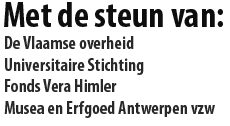A.K.L. THIJS
Lyn de melkboerin en de Brabantse omwenteling (1789). Context en bron van een Antwerps Liedfragment
Summary: Lyn the Milk farmer’s wife and the Brabant Revolution (1789). Context and source of an Antwerp song fragment
In 1860, an orally handed down song fragment was published in which Lyn the Milk farmer’s wife ‘a bronze statue that adorned a pump pillar in Antwerp until 1876) complains about the bad time. IN contradiction to what the publisher of the fragment presumed at that time, the song does not date from the French occupation but from the initial stages of the Brabant Revolution (1789). This can be deducted from the complete song text that figures on a rare flat print from the printing house of the ‘patriot’ J.B. Cartiaenssens. The anonymous song poet made Lyn, as a sensible housewife, take a political position. This positive image stands in sharp contrast with the words that the popular poets of the nineteenth century put in Lyn’s mouth. At that time, she was given the roll of an ignorant chatterbox. This is typical for the way many viewed the relation between women and politics in the nineteenth century middle-class (pseudo) democracy.
,
D. BILTEREYST, PH. MEERS, L. VAN DE VIJVER en G. WILLEMS,
Bioscopen, moderniteit en filmbeleving. Deel 1: op zoek naar het erfgoed van bioscopen in landelijke en minder verstedelijkte gebieden in Vlaanderen
Summary: Cinemas, modernity and movie perception. Part 1: In search for the heritage of cinemas in country and less urban regions in Flanders
Flanders and Belgium had an exceptionally varied cinema scenery. Next to the numerous cinemas in the big cities like Brussels, Antwerp and Ghent, people could go see a movie in provincial cities and even in rural districts. Belgium had international fame because of the high cinema rate. As part of a large-scale research project, De Verlichte Stad (The Enlightened City), Volkskunde dedicates two contributions to this interesting movie and film loving heritage. A first contribution focuses on the rich heritage of cinemas in smaller cities and rural districts. Based on a systematic historic inventory of regular venues in Flanders and Brussels, completed with an extensive number of case studies concerning the local cinema history in 46 Flemish cities and villages, the contribution looks for the causes or the background of the extensive cinema scenery. It primarily points to the phenomena of pub cinemas and denominationalism.
In a second contribution, Volkskunde will focus on the perception of movies through an oral history research project.
,
V. VAN ROY
Het Belgisch biertourisme als typevoorbeeld van de hedendaagse ‘globaliseringstendens’
Summary: The belgian beer tourism as typical example of the contemporary ‘Globalisation trend’
As well as abroad as at home, it is often claimed that Belgium or Flanders has a rich historical beer culture. Not rarely an identity characterization is borrowed from this beer past and the motto ’the older, the better’ seems to be the order of the day. Different- apparently divers – associations try to spread the beer culture by creating a well structured beer tourism. Even (popular) cultural (e.g. beer lover associations), economical (commercial beer industry and multinationals), political (government or local administrations) and even ‘flemishist’ parts in society have an important interest in a massive beer tourism. Tourists are being drawn in different ways by these associations within the scope of informative or recreational activities: beer happenings, parades, ‘lieux de mémoire’, city branding, country development, etc. Momentarily, the Belgian beer tourism is sky rocketing and, apart from a passive attitude, these last few decennia tourists are expected to play a more active role in the beer culture. The different associations try to put the authentic, local, small and traditional character of the Belgian (or Flemish?) beer in the spotlights. However, when profiling ‘our’ beer past, they often do not hesitate to take the historical facts for a little spin. The participants of this – frankly stated – ‘forged’ or ‘invented’ beer culture aren’t always aware of its artificial nature. The thread throughout this article is the remarkable conclusion that the associations are trying to propagate the local and small aspect of these ‘authentic’ beers through mass communication channels like the internet and grand promoting campaigns. This combination and mixture of a localization and globalization process can be combined into the characteristic notion of ‘globalisation’.
,

